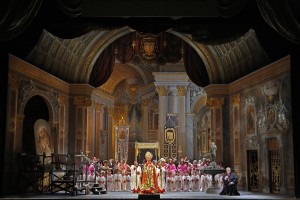AN OPENING NIGHT SURPRISE
It’s one of those instances that may just be talked about in the San Francisco opera circle for years to come. In Act One of Puccini’s Tosca (1900) at San Francisco Opera, we were treated to the glorious and beautiful strains of Romanian soprano Angela Gheorghiu, and although she grew in force as the act moved on, her voice was more buoyant than dramatic, and she seemed drowned out by the stupendous orchestra, led by the emotional and exaggerated conductor Nicola Luisotti, who 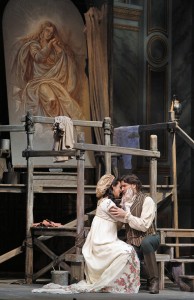 almost seemed at times to be swatting at flies; his conducting may have been a bit hammy, but I thought the orchestra sounded great, with the low brass resonating at a level usually reserved for Wagner (which makes sense when you consider that Puccini uses Wagnerian leitmotifs to identify characters).
almost seemed at times to be swatting at flies; his conducting may have been a bit hammy, but I thought the orchestra sounded great, with the low brass resonating at a level usually reserved for Wagner (which makes sense when you consider that Puccini uses Wagnerian leitmotifs to identify characters).
But just before Act Two, the lack of spark in Gheorghiu’s performance suddenly made sense: General Director David Gockley announced that Gheorghiu was struck with intestinal flu, and was taken by ambulance to the hospital. Replacing her would be understudy Melody Moore, who was given 20 minutes to prepare. It came to my attention that Moore had never performed this difficult role before, although she has certainly tackled other major roles, such as Mimi in Puccini’s La Bohème and Rescoria in Theofanidis’ Heart of a Soldier at SF Opera, and Countess Almaviva in Mozart’s Le Nozze di Figaro with Los Angeles Opera. Can you imagine the pressure? 20 minutes is not even enough time to warm-up, let alone be costumed and emotionally prepared.
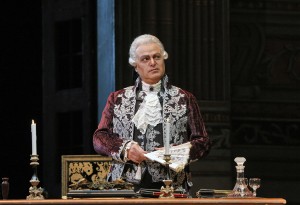 The plot up to this point involves diva Floria Tosca, who jealously suspects the innocent man she loves, painter Mario Cavaradossi (an appealing Massimo Giordano), of infidelity with the model for his new painting at Sant’Andrea della Valle in Rome. When a newly escaped revolutionary, Cesare Angelotti (bass-baritone Christian Van Horn), arrives at the church, Mario helps his friend flee. At the manipulative urging of the evil chief of police, Baron Scarpia (Italian baritone Roberto Frontali), Tosca goes to Mario’s home to spy on her lover.
The plot up to this point involves diva Floria Tosca, who jealously suspects the innocent man she loves, painter Mario Cavaradossi (an appealing Massimo Giordano), of infidelity with the model for his new painting at Sant’Andrea della Valle in Rome. When a newly escaped revolutionary, Cesare Angelotti (bass-baritone Christian Van Horn), arrives at the church, Mario helps his friend flee. At the manipulative urging of the evil chief of police, Baron Scarpia (Italian baritone Roberto Frontali), Tosca goes to Mario’s home to spy on her lover.
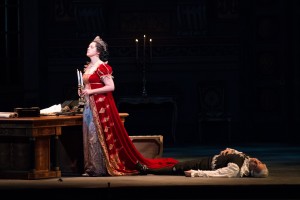 At the top of Act Two, Cavaradossi has been arrested and brought to Scarpia’s apartment in the Palazzo Farnese. All eyes were on Ms. Moore, who enters as Tosca just in time to see her lover taken away to be tortured. The American soprano arrived on the scene with fierce conviction and resolute vocals, not only delivering a powerhouse performance, but bringing a dramatic depth to the role that will no doubt have her considered should SF Opera revive Tosca again in a few years. Even my theater companion, distraught at the absence of Ms. Gheorghiu, had to admit that Ms. Moore not only saved the day, but was convincing and forceful with a full and ringing tone. When Tosca is offered a deal by Scarpia’”sex in return for Cavaradossi’s release’”she prays to God for help, asking why He has abandoned her, in the affecting aria, “Vissi d’arte.” We were simply floored by the cover’s performance, and the opening audience rightfully tossed prolonged cheers to the stage.
At the top of Act Two, Cavaradossi has been arrested and brought to Scarpia’s apartment in the Palazzo Farnese. All eyes were on Ms. Moore, who enters as Tosca just in time to see her lover taken away to be tortured. The American soprano arrived on the scene with fierce conviction and resolute vocals, not only delivering a powerhouse performance, but bringing a dramatic depth to the role that will no doubt have her considered should SF Opera revive Tosca again in a few years. Even my theater companion, distraught at the absence of Ms. Gheorghiu, had to admit that Ms. Moore not only saved the day, but was convincing and forceful with a full and ringing tone. When Tosca is offered a deal by Scarpia’”sex in return for Cavaradossi’s release’”she prays to God for help, asking why He has abandoned her, in the affecting aria, “Vissi d’arte.” We were simply floored by the cover’s performance, and the opening audience rightfully tossed prolonged cheers to the stage.
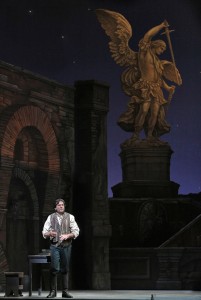 With Ms. Moore leading the way, and Mr. Frontali with a dark, sonorous timbre that matched his slimy character, Act Two had a palpable dramatic tension that was stimulating. And for non-opera folk, this scene is a reminder why Tosca is a perfect introduction to those who want to give opera a try. The story is thrilling and suspenseful, the score is lush and accessible, and the characters come off as real people, not caricatures.
With Ms. Moore leading the way, and Mr. Frontali with a dark, sonorous timbre that matched his slimy character, Act Two had a palpable dramatic tension that was stimulating. And for non-opera folk, this scene is a reminder why Tosca is a perfect introduction to those who want to give opera a try. The story is thrilling and suspenseful, the score is lush and accessible, and the characters come off as real people, not caricatures.
This production, in particular, is great for those who would normally avoid opera: the visuals are stunning (especially the Act One closer including the San Francisco Opera Chorus, with seemingly more people on stage than at a papal blessing): Director Jose Maria Condemi never allows his performers to be stagnant; Thierry Bosquet’s sumptuous and stately set and costume design recreates the company’s original 1932 production; and Christopher Maravich’s lights evoke the shadows and staccato shadings which would emerge from a room full of candles (his sunrise on Castel Sant’Angelo in the tragic third act is particularly magical).
By the way, tests revealed that Ms. Gheorghiu was severely dehydrated, and she anticipates returning to the War Memorial Opera House stage on Sunday, November 18 for her scheduled matinee performance.
photos by Cory Weaver/San Francisco Opera
photo of Melody Moore by Kristen Loken/San Francisco Opera
Tosca
San Francisco Opera at the War Memorial Opera House
Ms. Gheorghiu, Mr. Giordano, and Mr. Frontali play on 11/18, 11/21, 11/25, 11/28, and 12/1, 2012
Patricia Racette (Tosca), Brian Jagde (Cavaradossi), and Mark Delavan (Scarpia) play on 11/20, 11/24, 11/27, 11/29, and 12/2, 2012
for tickets, call 415-864-3330 or visit http://sfopera.com
($10 standing room tickets go on sale at 10 a.m. on the day of each performance)

